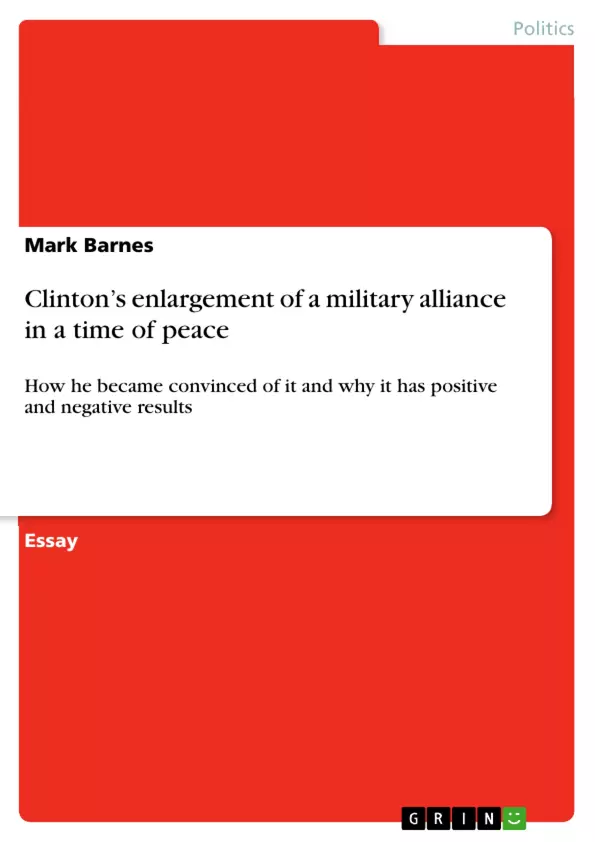This article examines why President Clinton decided to expand NATO, a military alliance that was built to defend against the Soviet Union, an enemy which was already defeated. NATO enlargement is even more interesting considering it was done in a time of peace. The decision to enlarge was largely a surprise. Most alliances either end when their adversary is gone or slowly erode, NATO on the other hand expanded. How President Clinton came to that decision and the reasons he did so are analyzed in this paper. In this paper I argue that Clinton was largely influenced through other players, including key foreign leaders and congressional republicans. He did however have good security reasons to do so as well. The enlargement of NATO had consequences that were both beneficial and detrimental. The positive and negative consequences of the decision to enlarge NATO are looked at through a military strategic, foreign relations, and economic perspective. The military strategic perspective is analyzed in terms of what resources and territorial rights the new countries allow NATO to have. The foreign relations perspective is seen in light in the worsening of U.S.-Russian relations. The economic perspective is looked at how much it costs the alliance financially to expand eastward.
Inhaltsverzeichnis (Table of Contents)
- Clinton's enlargement of a military alliance in a time of peace: How he became convinced of it and why it has positive and negative results
- The pressures he received from Central and Eastern Europe
- To increase Europe's security and decrease chances of future conflicts in the region
- Worry about Republican criticism on foreign policy in the Congressional elections of November 1994
- The consequences of Clinton's decision to expand NATO resulted in many different outcomes, the most important of which is that it made NATO a stronger, more secure alliance.
- The biggest negative consequence of NATO expansion was that it antagonized U.S.-Russian relations.
Zielsetzung und Themenschwerpunkte (Objectives and Key Themes)
This article explores the decision of President Clinton to expand NATO, a military alliance formed to counter the Soviet Union, during a period of peace. The paper examines the factors that influenced Clinton's decision, analyzing his motivations and the impact of the enlargement on various aspects, including military strategy, foreign relations, and economics.
- The influence of Central and Eastern European leaders and public opinion on President Clinton's decision to expand NATO.
- The potential for NATO enlargement to enhance European security and prevent future conflicts.
- The role of domestic politics, specifically the 1994 Congressional elections, in Clinton's decision to expand NATO.
- The positive consequences of NATO enlargement, including increased military strength and resources.
- The negative consequences of NATO enlargement, particularly the strained relations with Russia and the need for increased funding.
Zusammenfassung der Kapitel (Chapter Summaries)
The article explores the reasons behind President Clinton's decision to enlarge NATO in 1994. It highlights the significant influence of Central and Eastern European leaders and public opinion, who saw NATO membership as a way to secure their future and erase the legacy of Soviet domination. Additionally, the article discusses Clinton's belief that NATO enlargement would bolster European security and decrease the likelihood of future conflicts in the region. Furthermore, it reveals how Clinton's decision was also influenced by the upcoming Congressional elections, where he sought to avoid criticism from Republican lawmakers who favored a more aggressive stance towards Russia.
Schlüsselwörter (Keywords)
The article focuses on the key themes of NATO enlargement, President Clinton's foreign policy, the impact of the expansion on U.S.-Russian relations, and the security implications of the enlargement for Europe. It examines the political, military, and economic consequences of Clinton's decision, exploring the arguments for and against NATO expansion. The article also highlights the role of Central and Eastern European countries, Russian concerns regarding NATO's presence, and the potential for conflict between Russia and the West.
- Arbeit zitieren
- Mark Barnes (Autor:in), 2015, Clinton’s enlargement of a military alliance in a time of peace, München, GRIN Verlag, https://www.grin.com/document/336251



